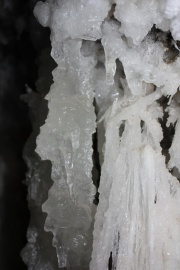Sulfates (Inventory)/Epsomite/Mirabilite
From LagWiki
| Line 4: | Line 4: | ||
Epsomite is soft and white or clear. It has a bitter taste though it is not appropriate to perform this test in the field. It may appear as needles, stalactites, stalagmites and other dripstone like formations. Mirabilite is clear and usually looks like ice. It has a slightly bitter or salty taste. Both are salts of different metals. Epsomite and mirabilite formations can change seasonally as they are influenced by humidity. They can grow so quickly as to trap and encase hibernating bats. They can also form over other speleothems. These formations are easily confused with similar gypsum formations such as [[Gypsum (Inventory)/Chandelier|Chandeliers]]. | Epsomite is soft and white or clear. It has a bitter taste though it is not appropriate to perform this test in the field. It may appear as needles, stalactites, stalagmites and other dripstone like formations. Mirabilite is clear and usually looks like ice. It has a slightly bitter or salty taste. Both are salts of different metals. Epsomite and mirabilite formations can change seasonally as they are influenced by humidity. They can grow so quickly as to trap and encase hibernating bats. They can also form over other speleothems. These formations are easily confused with similar gypsum formations such as [[Gypsum (Inventory)/Chandelier|Chandeliers]]. | ||
| - | ==See also== | + | ===See also=== |
*[[Gypsum (Inventory)/Chandelier|Gypsum Chandelier]] | *[[Gypsum (Inventory)/Chandelier|Gypsum Chandelier]] | ||
| - | ==Gallery== | + | ===Gallery=== |
<gallery> | <gallery> | ||
File:EpsomiteOnASodaStraw.jpg|Epsomite or Mirabilite on a calcite [[Calcite (Inventory)/Stalactite/soda straw|soda straw]] | File:EpsomiteOnASodaStraw.jpg|Epsomite or Mirabilite on a calcite [[Calcite (Inventory)/Stalactite/soda straw|soda straw]] | ||
| Line 15: | Line 15: | ||
</gallery> | </gallery> | ||
| - | ==References== | + | ===References=== |
*Palmer, Arthur N. (2007) ''Cave Geology'' CAVE BOOKS, Dayton, OH p 293 ISBN-13: [[Special:Booksources/978-0-939748-66-2|978-0-939748-66-2]], ISBN-10: [[Special:Booksources/0-939748-66-5|0-939748-66-5]] | *Palmer, Arthur N. (2007) ''Cave Geology'' CAVE BOOKS, Dayton, OH p 293 ISBN-13: [[Special:Booksources/978-0-939748-66-2|978-0-939748-66-2]], ISBN-10: [[Special:Booksources/0-939748-66-5|0-939748-66-5]] | ||
| - | + | <noinclude> | |
{{Cave inventory}} | {{Cave inventory}} | ||
| + | </noinclude> | ||
Revision as of 13:01, 25 April 2011
The Epsomite/Mirabilite field should be used to list stations where epsomite or mirabilite is observed.
Epsomite is soft and white or clear. It has a bitter taste though it is not appropriate to perform this test in the field. It may appear as needles, stalactites, stalagmites and other dripstone like formations. Mirabilite is clear and usually looks like ice. It has a slightly bitter or salty taste. Both are salts of different metals. Epsomite and mirabilite formations can change seasonally as they are influenced by humidity. They can grow so quickly as to trap and encase hibernating bats. They can also form over other speleothems. These formations are easily confused with similar gypsum formations such as Chandeliers.
See also
Gallery
Epsomite or Mirabilite on a calcite soda straw |
References
- Palmer, Arthur N. (2007) Cave Geology CAVE BOOKS, Dayton, OH p 293 ISBN-13: 978-0-939748-66-2, ISBN-10: 0-939748-66-5





